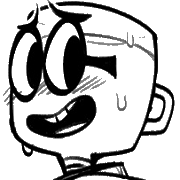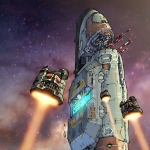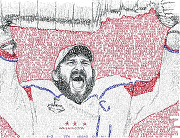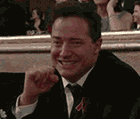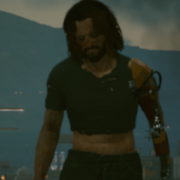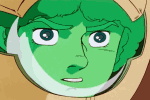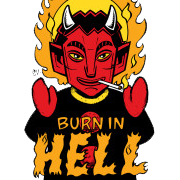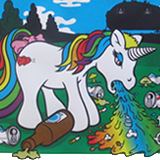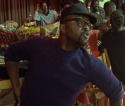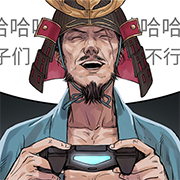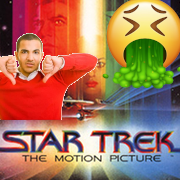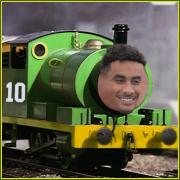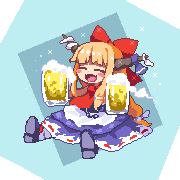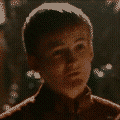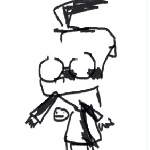|
turtlecrunch posted:I doubt it's better than The Empire Strikes Back! Tough call! It is in fact very good.
|
|
|
|

|
| # ? Jun 8, 2024 23:01 |
|
Neurolimal posted:It's actually cool that good things can evolve to become more relatable and accessible to newer generations. So far the only argument I've seen you guys make to this effect basically boils down to wanting all art and culture, pop or otherwise, to become homogenous. It all has to have the same sensibilities and point of view that you've decided "Millenials" as a whole want. The same sense of humor, the same style of directing, the same kinds of characters, the same sociopolitical statements they try to make, the same themes, etc. As long as it ticks those boxes no one should be critical of any of it. I'm a Millenial myself, but I think that's such an insulting notion in general, and one that's only doing harm to pop culture.
|
|
|
|
Neurolimal posted:It's a fantasy series set in the far pastfuture. Do you see the "success of idealism" and "growing up" in TFA? Slavery, we have Finn (not Rey, and not droids). I can see the argument that the prequels had themes of respect and integrity, but not the franchise as a whole.
|
|
|
|
I think the main issue with Rey's arc is that we're told neither where she's coming from or where she's going. The one thing holding her back is an obligation to her past, but since the nature of that obligation (or hope, or whatever) is withheld from us, it's difficult to relate to or sympathize with her. At the end she's chosen to move on, but we really have no idea what she's moving on to. Reconnecting with the force saves her life, but why does it follow that she's now up for joining the resistance and becoming a Jedi? She never encounters a Jedi or a resistance fighter before the final 3 minutes of the movie. Who sold her on this? If you had a movie where someone nonreligous said a prayer for the first time in during a low point, and then the next scene had them departing to China as a missionary, wouldn't that would be kind of strange? General Dog fucked around with this message at 18:24 on Mar 2, 2016 |
|
|
|
homullus posted:Do you see the "success of idealism" and "growing up" in TFA? Slavery, we have Finn (not Rey, and not droids). I can see the argument that the prequels had themes of respect and integrity, but not the franchise as a whole. Rey is too cynical regarding Star Wars to believe anything new could be better than waiting for Old Star Wars to return, Luke is rewarded for believing Vader can change and for holding onto his beliefs, Kylo is tempted by his father, but succeeds by refusing to let go of his faith in Snokes' guidance. Rey saves Finn and herself by facing her fears instead of continuing to flee to familiar wastelands. Han and Luke grow significantly from their initial immaturity as the series progresses, Rey learns to let go of her fears and her nostalgia to actually live (literally, in the case of the Starkiller forest). Finn abandons the guidance of the stormtroopers' parental figures (Hux and Phasma) to make his own decisions and live by his own morals. Finn frees himself from mental indoctrination, Rey chooses to starve rather than sell BB-8 into slavery, C3-P0 and R2-D2 finish their arcs by exercising their freedom to express their individuality (C3-P0) and retire (R2-D2), and neither are discarded or destroyed for becoming suboptimal (losing an arm, opting not to work), none of which would have been tolerated in their slave lives. I admit that some of it is a stretch, but no more than the OT and PT have been stretched within this thread to fit other readings.
|
|
|
|
Citizen Kane is the best Batman movie.
|
|
|
|
Neurolimal posted:I admit that some of it is a stretch, but no more than the OT and PT have been stretched within this thread to fit other readings. It's actually just simple misreading. Rey plays with Star Wars toys to distract herself while waiting for her parents to return. She is not waiting for the toys to come alive; she believes the events of the George Lucas films are 'just a myth'. Rey is waiting for her parents, not for Luke Skywalker. She isn't even very invested in the toys; she's actually a fan of Han Solo the 'real-world' smuggler. The basic narrative is Rey letting go of her (offscreen) birth parents and traveling into the world of myth - where she is seduced into fighting some opaque proxy war instead of being an outlaw like she wants. Under this 'Old Star Wars/New Star Wars' dichotomy, New Star Wars - the story of Rey the outlaw - is soundly rejected in favor of a substandard light side v. dark side narrative.
|
|
|
|
BrianWilly posted:Rey needs a copilot. This is the textual and subtextual message of all her scenes. Am I misremembering, or she wasn't she shown eyeing a TIE fighter? Regardless, the movie communicates the complete opposite notion of what you're suggesting. Finn and Han start discussing among themselves how they're going to heroically rescue Rey, and then Rey suddenly pops up behind them and subverts the audience's expectations by revealing that she doesn't actually need to be rescued by them, because she's already escaped. That's how the scene is constructed. After that point, the only time Rey is put into a position where the focus is on her vulnerability rather than her subversive resilience is when Chewbacca rescues her in the Falcon. Movies aren't real life. You can certainly analyze the scenario and conclude that, realistically, Rey probably wouldn't be able to escape from SKB all on her own, but the movie itself consciously decides to downplay that reality in favor of showing how resourceful and independent Rey is. It's a discordant note for the film to play in that moment, if the intent truly was to show that Rey needs people other than herself. quote:I don't think you're engaging with this film very well. It's not an arbitrary guideline to say that the protagonist of a bildungsroman needs to show psychological growth, and that the characters and situations she encounters along the way should inform this psychological growth by embodying societal qualities which the protagonist must choose to either reject or assimilate. That's just how you tell that kind of story. I feel like you think you're turning the "TPM doesn't have a protagonist" discussion around on me. That argument was dumb because TPM actually does have a protagonist. Saying that the protagonist has to be the same as the focal character is an arbitrary guideline. In contrast, simply saying that a story should have a protagonist is not an arbitrary guideline. Saying that the characters in a ANH-style coming-of-age story should serve some meaningful role in the protagonist's psychological development is, similarly, not an arbitrary guideline. quote:Han represents a father figure to Rey (The film outright states this. Why do you continue to ignore things the film outright states?) and Finn is a figure of hope to her (figures of hope are a prominent theme in the film. Leia sees it in Luke, Kylo sees it in Vader). Those connections -- in and of themselves -- inspire Rey's awakening because they have value -- in and of themselves -- to Rey's character that the story depicts. It's not some sort of...relationship vending machine where you insert friendship coins into them and they compensate this social debt with goods and services. That's not a friendship, that's a business transaction. Han and Finn could offer absolutely nothing at all to Rey besides their presence and loyalty and it would still mean the world to Rey because those are the exact specific things that the character of Rey needs, as strongly established by the film. The problem is you're not thinking in terms of stories. A story isn't "This guy is nice and he is my friend." A story is "This is what this guy taught me about life, and this is how I applied it." If you're not treating the characters essentially as "relationship vending machines", then you're not telling a story. You're just making a hang-out movie. Do you understand that weíre deconstructing a fictional narrative here? These characters arenít real people who exist in real life. Theyíre imaginary. They exist only to tell a specific story. Yeah, they need to fulfill a storytelling purpose, or else theyíre worthless. Sorry. quote:No, Rey makes choices, you just choose not to like them. She chose to help BB-8 and by that choice aligned herself with the Resistance's missions and morals, which she openly admires. She chose not to sell BB-8 for parts, even to the detriment of her own wellbeing and livelihood. She chose to take Finn and BB-8 back to their HQ, against her own inclination to stay on Jakku, even though they had already put her life and risk and were well past being her problem at that point. She tried to implore Finn to stay and help, even when she found out the truth about him, and rejected his offer of running out of the galaxy. Similarly, she chose to reject Han's job offer and Maz's guidance, which led to her own capture. All of these are strong moments of agency. All of these establish her character and drive the story. The only real significant positive choice among the ones you listed is her decision to not sell BB-8. Iíve already acknowledged that moment. My point is that it seems like a pretty odd moment to hinge Reyís entire character arc around. So Rey took pity on BB-8. Thatís great, but BB-8 isnít really a major character who means anything. Heís a prop. When she rejects Hanís job offer and Mazís guidance, itís because she wants to achieve her character goal of returning to Jakku to be a victim. She fails in that goal. The movie sees to that, because thatís a bad goal for her to have. She doesnít achieve her primary goal. Like Han Solo in ANH, she fails to achieve her goal, and as a result she becomes a better person. The difference is, Han Solo failed to achieve his goal of paying off Jabba because he decided to turn around and go back to the Death Star battle. Rey fails to achieve her goal of returning to Jakku to be a victim simply because Kylo Ren and the First Order keep interfering. She lacks agency. quote:All of which you ignore? Like, by your standards, Leia is the weakest character in all of Star Wars because every choice she makes is made when her life is in danger, including the ones she made when her life wasn't in danger because I shall pointedly ignore those because they're bad because I don't like them. Leia isnít the main character of A New Hope. The movie isnít really about her psychological development. Itís about Lukeís. TFA is all about Reyís psychological development. Rey is the Luke of TFA, not the Leia. quote:And Rey rejects this. Rey rejects the vision and the calling precisely because it's Not Right, not for her, and not for the scene. For your claim to hold water, Rey would have accepted Maz's guidance right there and the forced, inexplicable call to action would have been played straight. Instead, trying to force Old Star Wars onto New Star Wars causes Rey's body to have a literal traumatic experience and makes her sprint headlong in the opposite direction. Rey rejects the vision because she never even wanted to be a Jedi in the first place. She just wants to go back to Jakku. She makes a choice to pursue her ultimate goal of remaining a victim, and then she fails in achieving that goal only due to forces beyond her control. I never said Rey literally never makes any choices. What I said is that most of Reyís major choices revolve around her wanting to go back to Jakku, and those choices are of no consequence, because they yield nothing but failure. quote:It's kind of ingenius, really. Maz expects Rey to just see the lightsaber and suddenly be filled some some sort of glorious purpose, but she's going about it the wrong way; she's so desperate for someone to be Luke again that she then shoves the saber at someone even less fitting than Rey to wield it. The film then purges Maz from its own system precisely because her way has failed, and chooses not to dwell on her failure any more That might work if Rey wasnít being wedged into the Luke role of the ANH template. Like I said, she goes through essentially the same kind of arc Han Solo goes through in ANH. She starts out with a bad motivation, and over the course of the movie her motivation changes to something completely different and better. But that kind of arc doesnít work for the protagonist of an ANH-style coming-of-age story. Han Solo would not work as the protagonist of ANH, for precisely that reason. If J.J. wanted to tell a story about a heroine whose driving motivation was a desire to wallow in immaturity forever, he shouldnít have ripped off the template of ANH. The ANH template is designed to support a protagonist whose driving motivation is a desire to attain maturity. I really donít think Iím being unreasonable. Iím not saying J.J. isnít allowed to tell his own kind of story. Iím saying that if he wants to tell his own kind of story, heíd better go all out and actually tell his own kind of story. There was no reason to hew so closely to the template of ANH. It makes no sense for the story. Cnut the Great fucked around with this message at 21:08 on Mar 2, 2016 |
|
|
|
BrianWilly posted:(And way to reach on "political conscientiousness." The only bit of political acumen Luke ever exhibits across all three films is) And I want to address this specifically, because this shows you have no business telling me that I'm bad at watching movies. Leia is the one who draws Luke into the political conflict against the Empire. Her hologram message entrances Luke and for the first time inspires him to want to take action in service of a cause greater than himself. Leia is the reason Luke embarks on his first independent quest without Obi-Wan's guidance, when he formulates a plan to rescue her from her prison on the Death Star. Luke becomes a hero in the first place as a result of being called to complete Leia's original political mission. "Political conscientiousness" is (quite obviously) what Leia represents to Luke. This is a fact, BrianWilly. The Making of Star Wars posted:ďThe princess is everything Luke wants to be,Ē Lucas says. ďShe is socially conscious, whereas he is thrown into things; intellectually, she is a strong leader, and he is just a kid.Ē
|
|
|
|
The author lives! 
|
|
|
|
Cnut, why are you so insistent that just because it looks like ANH in many of its strokes that it must then stay that course for it to be, I don't even clearly grasp your issue consistency, internal logic? You're upset that Rey's arc isn't really Luke's arc, except she isn't really Luke in fact her entire arc is about trying to not be him. Why is it inappropriate for a Han character arc to be the core for this new protagonist, is it because it doesn't just map nicely? I'm just not sure if you'd have been happier with Rey being exactly like Luke or if she'd had absolutely nothing in common with his story arc. I actually like your idea that her character arc more closely aligns with Han's, but given that many of the characters are given more of a presence in the story than most of the characters outside of Luke were given in ANH I don't see why his archetype can't carry for one of those protagonists. If anything FN more closely ties in with Luke's arc, he's a naive guy who had dreams of being part of the big thing, then sees an awful massacre which changes his entire perspective on his life and what he should be doing with it. If anything those subversion's of those original archetypes were what made the movie fun. I'm really struggling to understand why its "bad" or lacking that certain character arcs/motivations have been ascribed to different protagonists and their origins this time around. What is so inherently bad about that type of arc being one of the central ones, I actually think that while Rey is our primary hero, our other characters were given a lot more to do with many of the important sequences than their parallels were in ANH. Now that you've brought it up her interest in Han really makes more sense than an interest in Luke because his character more closely aligns with her life experiences to that point, given that feels like some solid archetyping to work from. At the end of that big post you basically said "Han's character arc is an inappropriate one for the Hero's story", maybe you aren't giving JJ and the Disney team enough credit for doing more that was different than you want to give them credit for? I can grasp a lot of the agency concerns in that the story forces her along, but I really can't grasp why the characterization they group and the archetypes they used weren't good for the "film/Star Wars".
|
|
|
|
|
No thank you.   (USER WAS PUT ON PROBATION FOR THIS POST)
|
|
|
|
The Notorious ZSB posted:Cnut, why are you so insistent that just because it looks like ANH in many of its strokes that it must then stay that course for it to be, I don't even clearly grasp your issue consistency, internal logic? You're upset that Rey's arc isn't really Luke's arc, except she isn't really Luke in fact her entire arc is about trying to not be him. Why is it inappropriate for a Han character arc to be the core for this new protagonist, is it because it doesn't just map nicely? It's a matter of the execution, and a major first step is to identify what the narrative actually is. As I went over earlier, Rey's narrative is fundamentally about how her burgeoning career as an outlaw is derailed because she's been pressured into fighting some bullshit war. In other words, Han's role in the narrative is to be a variation on - and redemption of - the Uncle Owen character, telling Rey to stay away from that Force-And-Destiny stuff. And in this case, of course, Han would be right. Luke was wrong to try and start another Jedi Order, and Rey should reject the fake light/dark dichotomy - fighting to save the lives of the 'scavenger scum' instead. Rey ultimately makes the bad choice and betrays Han, out of the pressure to avenge him. The film mixes its metaphors here, though, because Han gets all starry-eyed when saying all the myths are true, then introduces Rey to the new Yoda. Han's opposition to the Resistance is so subtle as to be nonexistent - and the result is that Rey is never confronted with a (philosophical) choice between Han and Leia. Rey simply gets to have the cake and eat it too. When asked if all the legends are true Han's reply should be "yeah - but it's a lot of horse-poo poo."
|
|
|
|
TFA made my wife and kids love star wars, they even all demanded we go see it a second time in IMAX, even though they kinda dragged their feet when I demanded we drive an hour to do so, and were kind of lukewarm after marathoning 1-6 beforehand, so I like it.
|
|
|
|
Cnut the Great posted:And I want to address this specifically, because this shows you have no business telling me that I'm bad at watching movies. Leia is the one who draws Luke into the political conflict against the Empire. Her hologram message entrances Luke and for the first time inspires him to want to take action in service of a cause greater than himself. Leia is the reason Luke embarks on his first independent quest without Obi-Wan's guidance, when he formulates a plan to rescue her from her prison on the Death Star. Luke becomes a hero in the first place as a result of being called to complete Leia's original political mission. Indeed, Luke is drawn into a political conflict because of Leia. You might even propose that seeing Leia in danger inspires a higher moral calling within Luke...but morality isn't politics, or weren't you paying any attention to the prequel trilogy either? To equate Luke's call to active heroism with political conscientiousness, on top of conflating it with the sort of direct influence on Luke's worldviews that Obi-Wan and Han had, is baseless and reaching. You might as well declare that BB-8 teaches Rey to be politically-conscientious. Cnut the Great posted:Am I misremembering, or she wasn't she shown eyeing a TIE fighter? Moreover you are still dismissing Rey's emotional vulnerability as a valid sort of vulnerability, a valid sort of threat that she has to overcome, and I do see now why you're doing this: You think she's Luke. You are looking at Daisy Ridley and inexplicably seeing Mark Hamill. You're treating Rey's story as Luke's story, and Luke already grew up with family and friends and of course he wouldn't need the sort of help that old man Solo and Finn had been giving to Rey. You think I'm simply being goonishly flip or facetious when I accuse you of not engaging with this film very well. I'm not. I'm describing your symptoms. You are, in fact, not watching Star Wars: The Force Awakens. Cnut the Great posted:It's not an arbitrary guideline to say that the protagonist of a bildungsroman needs to show psychological growth, and that the characters and situations she encounters along the way should inform this psychological growth by embodying societal qualities which the protagonist must choose to either reject or assimilate. That's just how you tell that kind of story. The purpose of Finn and Han is to take Rey away from Jakku, wherein "Jakku" is the physical representation of both her core wound and her own attachment to that core wound. They take her away from that place by physically, geographically transporting her somewhere else, and also by fulfilling the emotional needs that she had been trying to salvage from a barren desert planet. Apropos of nothing, the very first world they take her to is lush and thriving. "I didn't know there was this much green in the whole galaxy." You think she was talking about the trees? Luke is also from a desert world but the only way he could care less about trees is if they started talking politics with him. Han and Finn show Rey that she's not alone and she has a place with them away from the desert, amongst the trees, amongst the living. You're rolling your eyes right now and preparing to type up a response about how pithy that is and how it doesn't meet your lofty storytelling standards wherein Support Character 3 must needs provide Reluctant Hero 2 with X amount of theme points at the 45 minute mark without exceeding Y-compliant Agency parameters. In doing so you continue to disengage with Rey's story as it actually is, about a lost, lonely, self-reliant girl is bolstered into being an active force for change in the galaxy through her association with others who are, in their own ways, just as lost and lonely and attached to the wrong things as she was. In doing so you blind yourself to the importance these relationships hold to the story. Cnut the Great posted:The only real significant positive choice among the ones you listed is her decision to not sell BB-8. Iíve already acknowledged that moment. My point is that it seems like a pretty odd moment to hinge Reyís entire character arc around. So Rey took pity on BB-8. Thatís great, but BB-8 isnít really a major character who means anything. Heís a prop. Nope, she chooses to leave Jakku behind. She takes up Han's ship, dresses like Han, and goes to finish Leia's mission. Whatever comes next will have happened directly because of this decision. Sure sounds to me like she's grown as a character! Even if you somehow believe she hasn't had enough agency in the film, isn't it worth noting that she achieves it by the end? This is the problem with you trying to overlay ANH on top of TFA like some kind of secret blueprint. Pieces aren't going to fit, borders aren't going to line up, edges are going to snag, one or both films is going to come across worse. It doesn't make me think that Rey should have done things more like Han here...or Luke, or anyone else... it would just makes things more willfully restrictive for her as her own character.
|
|
|
|
Episode 9 ends with Rey being elected Queen of the Galaxy
|
|
|
|
Originally I thought First Order represented OT fanatics dedicated to "pure" Old Star Wars, but the longer this thread goes on the more I'm thinking they're the PT fans...
|
|
|
|
Neurolimal posted:Originally I thought First Order represented OT fanatics dedicated to "pure" Old Star Wars, but the longer this thread goes on the more I'm thinking they're the PT fans... Yes, people who like things that you don't like are literal villains. That's the true message of TFA.
|
|
|
|
Neurolimal posted:Originally I thought First Order represented OT fanatics dedicated to "pure" Old Star Wars, but the longer this thread goes on the more I'm thinking they're the PT fans... The OT fanatics is the rose tinted Rebels, who have all your old favorite
|
|
|
|
Schwarzwald posted:Yes, people who like things that you don't like are literal villains. That's the true message of TFA. Moreso in that neither are willing to drop their relics and move on to appreciate the new universe. First Order are a bunch of nostalgic misguided kids, not really villainous (at least in general, obviously executing villagers is pretty terrible).
|
|
|
BrianWilly posted:Being a soldier, a warrior, a righteous sword...has little to do with political conscientiousness or interest. Yes, it does. What's a soldier or warrior without a state? Or a righteous sword with no cause? There have to be politics involved, or he's just a thrill seeking mercenary. Which, actually, is how Luke comes off at first - he wants badly to go to the Imperial Academy, mostly so he can be a hotshot pilot. Also because some friends are there, and, distant third, because maybe it's a way to eventually find the Rebellion (that sub plot was cut out of the film). When Ben first brings up Luke joining the conflict, Luke sort of shrugs it off: "Look, I can't get involved. I've got work to do. It's not that I like the Empire; I hate it, but there's nothing I can do about it right now... It's all such a long way from here." He actually doesn't really feel strongly about the fight, aside from wishing he could fly around and blow poo poo up too. It's not his battle, there's nothing he can do. Contrast this with his disappointment in Han (a character who remains mostly non-political) at both the end of ANH and the start of ESB - Luke believes strongly in one side now, and can barely believe somebody would value something more than his side's cause. Sure, he's more of a zealot than anything, but how can you be an apolitical zealot?
|
|
|
|
|
Neurolimal posted:Originally I thought First Order represented OT fanatics dedicated to "pure" Old Star Wars, but the longer this thread goes on the more I'm thinking they're the PT fans... That is because your opinion is based on a network of tautologies and a set conclusion from which you are slowly working backwards. Star Wars represents Star Wars, the new guys represent new guys, and the bad guys represent bad guys. Conclusion: everything bad in Star Wars: Force Awakens is because of lack of novelty. Except when it's not. In a meta way.
|
|
|
|
Neurolimal posted:Moreso in that neither are willing to drop their relics and move on to appreciate the new universe. This "New Star Wars vs Old Star Wars" interpretation is trite and jejune for the most part. It's frequently used as a lazy way to dismiss any criticism of the new films, and considering everything from the marketing, to the plot, to the cast in TFA seems tailor-made to exploit nostalgia of "Old Star Wars" fans, this dichotomy you've concocted is inaccurate and simplistic. Furthermore, as I said previously, even if this new trilogy was actually founded on iconoclasm(and that's a stretch), that's not an inherently noble or entertaining thing, nor does it mean anything that it's "replacing" is better or good at all. This isn't a profound point you're making, it's a hand wave you use to try and deflect criticism of the movie, and it frequently seems like you're trying to post like SMG and other prequel-defending posters without actually understanding the substance of their arguments. I disagree with SMG on many things, but a riff of his "Star Wars fans hate Star Wars" quote isn't enough to act as a substantial counter of the arguments of those who are critical of TFA and/or complimentary about the prequels(because it's worth noting those two things are not necessarily found together). The entire saga has themes of generational conflict, harmony, and succession, really, so there's nothing especially noteworthy or novel about this movie in that regard, either.
|
|
|
|
Rey finishes the film by trying to give the lightsaber away. She took it from Kylo Ren because it was expedient, because it was a weapon she could use to fight him, because she wanted to prevent him from having it - because, simply put, she gave in to her hate. The Dark Side is tempting her. Friendly-looking faces like Maz encourage her to fight in a war and become great. Leaving Jakku behind means she has two obvious options: become Han, flying the Millennium Falcon around the galaxy and surviving in seedy but non-war-torn places; or become Luke, learning the ways of the Force and contending with her anger with the fate of the galaxy at stake. Either Luke accepts the lightsaber and comes out of retirement and she just flies away, or she accepts his teaching. Now, we're obviously meant to understand the second thing is the one that will happen. Kylo Ren connects her to both of her mentors, and he faces a parallel temptation; such rivalry can only be consummated in a lightsaber duel. But that's cause to worry for her, because the Force has been dangerous to her soul.
|
|
|
|
Prolonged Priapism posted:Yes, it does. What's a soldier or warrior without a state? Or a righteous sword with no cause? There have to be politics involved, or he's just a thrill seeking mercenary. Which, actually, is how Luke comes off at first - he wants badly to go to the Imperial Academy, mostly so he can be a hotshot pilot. Also because some friends are there, and, distant third, because maybe it's a way to eventually find the Rebellion (that sub plot was cut out of the film). When Ben first brings up Luke joining the conflict, Luke sort of shrugs it off: Where I'm drawing the line is the idea that Luke has given any more thought to his position against the Empire than "Those are the bad guys, and I have to defeat them." It's an entirely correct viewpoint, lest anyone thinks I'm mocking it, but it's a moralistic view, not a political one. Luke is morally-conscientious, not politically-conscientious -- and I'm hoping I don't have to spell out the difference for anyone -- and his perspective on the intricate political backdrop of Star Wars, whatever that may be, is really not something that forms some vital core of his character.
|
|
|
|
BrianWilly posted:Okay. I can see where Luke is a political character in the sense that a soldier is necessarily a political creature. Luke fights in a political conflict, kills for his cause, and throws his weight behind a clear ideological faction. And I certainly don't want to downplay the political importance of Luke. I kinda feel like everyone in the Rebellion opposed the Empire solely on moral grounds, though. I mean, if you strip away all the atrocities that they committed it was a pretty well-organized government that got poo poo done, unlike the Old Republic.
|
|
|
|
Someone made a set of    
|
|
|
|
Lt. Danger posted:Orson Welles stars as The Clapping Man in the 1941 feature film The Man Who Clapped. I would watch that movie.
|
|
|
|
drunkill posted:
Checks out. Mm, grain.
|
|
|
|
Preorder at half-price ($20) is up for TFA blu-ray http://www.amazon.com/Star-Wars-Force-Awakens-Blu-ray/dp/B018FK66TU/ Doesn't appear to have a 3D version
|
|
|
|
turtlecrunch posted:Preorder at half-price ($20) is up for TFA blu-ray http://www.amazon.com/Star-Wars-Force-Awakens-Blu-ray/dp/B018FK66TU/ Is there anyway to tell if the blu ray comes with the HD digital copy or SD? And is the digital copy the itunes versions or the UV version? I buy 99% of my movies on itunes, but I want to pickup this one on blu ray. I saw it said digital version was included, so if i can get the blu ray and itunes in one purchase thats a hookup. edit crap, your correct. I forgot disney owned all things now. badjohny fucked around with this message at 21:43 on Mar 3, 2016 |
|
|
|
It's a Disney movie so won't it use their thing? I believe you can link that to iTunes or UV.
|
|
|
|
drunkill posted:Someone made a set of Where's Episode III?
|
|
|
|
Pops Mgee posted:Where's Episode III? For that matter, where's Episode I?
|
|
|
|
Those movies don't have Star Destroyers in them. Also, they're not as good.
|
|
|
|
Episode 3 definitely opens with a star destroyer.
|
|
|
|
The ship that Qui-Gon and Obi-Wan arrive in looks like a star destroyer, and the Republic vessels during the war are early-model star destroyers painted red.
|
|
|
|
Goddamnit, there are so many Star Wars blu-rays out I can't figure out what to get. Is there any that offers actually extra decent special features, or are they all basically the same outside of packaging? I don't care about dumb poo poo like steelbooks or digital copies or whatever.
|
|
|
|
Bongo Bill posted:The ship that Qui-Gon and Obi-Wan arrive in looks like a star destroyer  Not unless "looks like a star destroyer" means "is a spaceship".
|
|
|
|

|
| # ? Jun 8, 2024 23:01 |
|
I think the only one with special features is the saga set. I think then trilogy packs are just the films.
|
|
|





